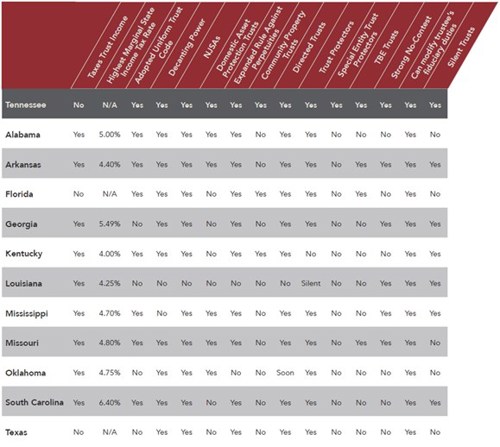The Situs of Your Trust: It Just Means More

I have always been a college football fan—in my opinion, the pageantry, traditions, and unbridled excitement of a college football Saturday exceed those in professional ranks. One of the unique features of college football is the home-field advantage. Nowhere is that more true than in the SEC, where six of the current 16 SEC member schools boast stadiums with more than 100,000 seats. There are countless interviews from players and coaches who talk about the home-field advantage, both as beneficiaries and as victims. From crowd noise and the playing surface to the light configuration and rowdy student section, it turns out that where you play matters. The SEC’s motto is “It just means more.” When it comes to trust situs planning, the same holds true.
You cannot spell “Volunteer State” without the letters T-R-U-S-T. For many years, Tennessee has been a leading situs[1] for trusts, even landing at the top of trust-friendly state rankings (yes, they really exist). You may wonder what separates Tennessee’s trust laws from its neighboring states. Over the past 20 years, the Tennessee legislature has been very proactive in passing laws to make Tennessee a premier trust situs. In the spirit of upcoming college football season, below are not only some key features of Tennessee trust law that make the Volunteer State an attractive situs for trusts, but also how those key features compare with other Southeastern Conference states[2] with respect to trust laws.
No State Income Tax on Undistributed Trust Income
Tennessee repealed the Hall Income Tax in 2021, becoming one of nine states with no state income tax on accumulated income and capital gains for trusts. This is one of Tennessee’s greatest advantages over other Southeastern Conference states, as the highest marginal state income tax rate ranges from 4.0% in Kentucky to 6.4% in South Carolina.[3] Florida and Texas are the only other Southeastern Conference states without an income tax.
Nonjudicial Settlement Agreements
Historically, the process of modifying or terminating a trust was both time-consuming and costly. To address these concerns, most states allow nonjudicial settlement agreements (NJSAs), which allow changes to trust documents without going before a judge and obtaining a court order.[4] The distinguishing factor in NJSA statutes is what changes may occur without a court order. Tennessee grants wide latitude in NJSAs, allowing trust modifications by the unanimous agreement of the trustee and all qualified beneficiaries “if such modification does not violate a material purpose of the trust.”[5] Alabama, Arkansas, Florida, Georgia, Kentucky, Mississippi, Missouri, and Texas have enacted NJSA statutes[6] that mirror Tennessee’s, while South Carolina’s NJSA statute restricts matters that a NJSA may resolve.[7] Oklahoma’s legislature enacted a NJSA statute that becomes effective November 1, 2024, with nearly identical language to Tennessee’s statute.[8]
Broad Powers to Modify Trusts
An irrevocable trust, despite its name, can be changed. One widespread practice to modify irrevocable trusts is known as decanting, a process by which a trustee with discretionary distribution authority “pours” the contents of the trust into a new trust, often with modified provisions. Tennessee has broader decanting powers than states who adopted the decanting provisions of the Uniform Trust Code. For example, Tennessee allows a trustee to decant from a trust with an ascertainable standard (health, education, maintenance, or support) to a discretionary trust. If a trust contains language that an irrevocable trust cannot be modified without a court order, a trustee could decant the trust into another trust that does not prohibit modifications. Further, a trustee of a Tennessee trust can decant a trust without providing notice to the trust’s beneficiaries. Other reasons to decant a trust include changing a trust’s governance, changing the law applicable to the trust, modifying trust provisions, and updating obsolete trust language. Unlike Tennessee, trust laws in Mississippi and Louisiana do not include decanting powers. Of the states that have a decanting power, Georgia uniquely allows a trustee to decant a trust with an ascertainable standard into a discretionary trust.[9]
Community Property Trusts
Tennessee is one of a few separate property states that allows married couples to hold property as “community property” in trust. The distinction is important because separate property receives different tax treatment than community property does. Community property trusts are popular landing spots for appreciated property, as assets held in a community property trust receive a full step-up in cost basis, as opposed to a half step-up, at each spouse’s death. For example, suppose one spouse transfers $1 million of low cost basis stock into a community property trust. When the first spouse dies, the surviving spouse receives a full step-up in cost basis. If the surviving spouse decides to sell the stock after the first death, he or she may owe little to no capital gains taxes on the $1 million stock sale. If the surviving spouse does not sell the stock, then upon such spouse’s death, the stock receives another full step-up in basis. Of the Southeastern Conference states, only Florida and Kentucky join Tennessee in allowing community property trusts.[10] Texas and Louisiana are community property states.
Self-Settled Asset Protection Trusts
Tennessee law allows two types of self-settled asset protection trusts, meaning that regardless of residency, an individual may create a trust for his or her own benefit and enjoy creditor protection. The first type of self-settled asset protection trust is the Tennessee Investment Services Trust (TIST), which allows the grantor to retain beneficial ownership of trust assets while protecting the assets from claims of most creditors, provided the trust meets certain requirements. The second type of self-settled asset protection trust is the marital asset protection/tenancy by the entirety trust, which adds the creditor protection of jointly titled property with the usual benefits of a trust. Like the TIST, tenancy by the entirety trusts have statutory requirements to provide both spouses with protection from their spouse’s separate creditors. Mississippi and Missouri are the only other Southeastern Conference states to allow self-settled asset protection trusts.[11] Only Arkansas and Missouri trust laws allow tenancy by the entirety trusts, while Florida allows them under established case law.[12]
Dynasty Trusts
An individual intending to build generational wealth without incurring federal estate tax may want to utilize a dynasty trust. The problem for trust creators in some states is the common law Rule Against Perpetuities, which holds that any future interest in property must vest or fail within 21 years of after the death of some person who was alive when the interest was created. Many states have modified the common law Rule Against Perpetuities. While most Southeastern Conference states take the wait and see approach, Tennessee expanded the period to determine whether an interest vests or fails to 360 years,[13] one of the longer periods in the United States. Tennessee’s legislature recently clarified that trusts that are moved to Tennessee from jurisdictions with longer durations (i.e., 1,000 years or perpetual) maintain their original durations when the trust’s situs changes to Tennessee. Of the Southeastern Conference states, Louisiana has the shortest Rule Against Perpetuities, stating that in interest must vest or fail within 20 years after the death of the last settlor to die.[14] Oklahoma follows the common with a 21-year Rule Against Perpetuities. Arkansas, Mississippi, and South Carolina each adopted the UTC’s 90-year Rule Against Perpetuities.[15] Alabama extended its Rule to one hundred years,[16] and Texas recently extended its Rule to three hundred years.[17] Florida and Georgia match Tennessee’s 360-year Rule,[18] while Kentucky and Missouri allow trusts in perpetuity.[19]
Strong No-Contest Provisions
Tennessee trust law has a broad no-contest statute,[20] meaning a trust creator can disinherit any beneficiary who contests the trust’s provisions. Further, beneficiaries may only challenge a trust’s provisions when there is fraud, undue influence, or lack of testamentary capacity.[21] Arkansas, Louisiana, and Mississippi share Tennessee’s strong no-contest preference, having no “good faith” exception to contests,[22] while Alabama, Georgia, Kentucky, Missouri, Oklahoma, South Carolina, and Texas narrowly enforce no-contest provisions.[23] Florida law renders no‑contest provisions unenforceable.[24]
Silent Trusts
Sometimes, it makes sense to establish a trust for beneficiaries who are unaware of the trust. Grantors may want to incentivize their beneficiaries to work hard and pursue a career so that their children do not become “trust fund kids,” or they might want the trust distributions to be a surprise. Silent trust laws are rare, as most states require the trustee to keep all beneficiaries reasonably informed. Tennessee law specifically allows a grantor to waive the trustee's duty to inform and report to the beneficiaries.[25] Arkansas, Georgia, Louisiana, and South Carolina also allow silent trusts,[26] and Kentucky and Mississippi allow the trustee to report to a surrogate rather than a beneficiary.[27] Alabama, Florida, Missouri, Oklahoma, and Texas do not allow silent trusts or place an age limit on when beneficiaries must be notified.
Directed Trusts
Traditional trust services such as investment management may be unbundled using directed trusts. While most states allow directed trusts,[28] Tennessee is on the forefront of directed trust laws, allowing a grantor to name (1) a trust advisor/trust protector who may direct the trustee and take actions that the trustee may or may not otherwise perform, (2) an excluded fiduciary who is immune from tort liability for actions taken when directed by a trust advisor/protector, and (3) limited fiduciary, whose only duty is to act in good faith and in accordance with the terms and purposes of the trust’s and the beneficiaries’ interests.[29] Alabama, Arkansas, Florida, Georgia, Mississippi, Missouri, South Carolina, and Texas have broad directed trust statutes,[30] while Kentucky has a limited directed trust statute that allows for investment managers but not trust protectors.[31]
Waiving Trustee Liability
By default, trustees are held to several fiduciary duties that expose the trustee to personal liability for certain acts or omissions. Those duties typically include the duty of good faith in administering the trust, loyalty, impartiality, prudent administration, prudent delegation, controlling and protecting trust property, recordkeeping and identification of trust property, enforcement and defense of claims, informing and reporting to beneficiaries, and diversification.[32] In Tennessee, grantors may modify the trustee’s default fiduciary duty to diversify, allowing the trust to hold concentrations in stock, a closely held business, or aggressive investments.[33] While Tennessee trust law prescribes certain nonwaivable duties, it also provides that a trust document may alter or override any other duty, including the duties of skill, care, prudence, loyalty, and possibly the duty of good faith.[34] Outside of Tennessee, Louisiana allows trust instruments to waive the most trustee liability. All other states allow modification of a trustee’s fiduciary duties, albeit on a smaller scale.[35]
Special Purpose Entity Trust Protectors
Under a 2019 change to Tennessee trust protector law, a trust protector may be a special purpose entity like an LLC if it meets certain requirements. The change to the law could allow a trust with a situs in a state that taxes income to avoid income taxation when that taxation is based on the residency of the trust fiduciary. For example, suppose a Tennessee grantor establishes a Tennessee trust, names a Tennessee corporate trustee, and appoints a relative in South Carolina as trust protector. Under the new law, the South Carolina relative could establish a Tennessee single member LLC, a special purpose entity, to serve as the trust protector instead of the relative. The trust would also avoid state income tax. Further, because the special purpose entity has limited liability protection, the relative would have the same liability protection as other limited liability entities. Tennessee is the only Southeastern Conference state that allows special purpose entity trust protectors.[36]
Final Thoughts
When measured broadly across several metrics, Tennessee is the only Southeastern Conference state that checks every box, including no state income tax on trust accumulations, flexible decanting power, and special purpose trusts. All of which demonstrate the state legislature’s intent to remain a top-tier trust situs.

As demonstrated in the chart above, trust laws vary from state to state. When selecting the state for your trust situs, the decision has far-reaching consequences. Although a trust situs provision is usually one small sentence in a trust document, it really does mean more. As shown above, Tennessee stands above its Southeastern Conference state peers with respect to its trust laws. If you have an existing trust with a situs in another state, fear not. The transfer portal may be open. If you would like to learn more about trusts in Tennessee or have a question about moving your trust situs to Tennessee, we’d love to have a conversation.
[1] The situs is the legal name describing the state where is a trust is managed.
[2] The author understands that the topic of which states are “Southern” or “Southeastern” may lead to a heated discussion. For purposes of this article, however, the term Southeastern Conference states includes the following states featuring at least one Southeastern Conference (SEC)-member institution: Alabama, Arkansas, Florida, Georgia, Kentucky, Louisiana, Mississippi, Missouri, Oklahoma, South Carolina, Tennessee, and Texas.
[3] Audrey Yushkov, State Individual Income Tax Rates and Brackets, 2024, Tax Found., https://taxfoundation.org/data/all/state/state-income-tax-rates-2024/ (Feb. 20, 2024) (last visited July 18, 2024).
[4] Louisiana is the only Southeastern Conference state that does not allow NJSAs.
[5] Tenn. Code Ann. § 35-15-111(b) (2023).
[6] Ala. Code § 19-3B-111 (2023); Ark. Code § 28-73-111 (2020); Fla. Stat. § 736.0111 (2023); Ga. Code Ann. § 53-12-9 (2022); Ky. Rev. Stat. Ann. § 386B.1-090(4) (2014); Miss. Code Ann. § 91-8-111 (2020); Mo. Stat. Ann. § 456.1-111 (2023); Tex. Prop. Code Ann. § 114.032 (2021).
[7] S.C. Code Ann. § 62-7-111(b) (2023).
[8] Okla. Stat. Ann. § 60-1402 (2024); see also Tenn. Code Ann. § 35-15-111(c) (2023) (containing language “Matters that be resolved by a nonjudicial settlement agreement include, but are not limited to. . . “).
[9] Ga. Code Ann. § 53-12-62 (2022).
[10] Fla. Stat. § 736.1501 et seq. (2023); Ky. Rev. Stat. Ann. § 386.622 (2023).
[11] Miss. Code Ann. § 91-9-701 et seq. (2020); Mo. Stat. Ann. § 456.5-505 (2023).
[12] Ark. Code § 28-72-601 et seq. (2020); Mo. Stat. Ann. § 456.950 et seq. (2023). See also First Nat’l Bank v. Hector Supply Co., 254 So.2d 777 (Fla. 1971); Beal Bank, SSB v. Almond & Assocs., 780 So.2d 45 (Fla. 2001).
[13] Tenn. Code Ann. § 66-1-202(f) (2021).
[14] La. Rev. Stat. § 9:1831 (2023).
[15] Ark. Code § 18-3-101 (2020); Miss. Code Ann. § 89-25-3 (2020); S.C. Code Ann. § 27-6-20 (2023).
[16] Ala. Code. § 35-4A-2 (2023).
[17] Tex. Prop. Code Ann. § 112.036 (2021).
[18] Fla. Stat. § 689.225(2)(f) (2023); Ga. Code Ann. § 44-6-201(a) (2022).
[19] Ky. Rev. Stat. Ann. § 381.224 (2023); Mo. Stat. Ann. § 456.025 (2023).
[20] Tenn. Code Ann. § 35-15-1014 (2023) (“Pursuant to this section, courts shall enforce the settlor’s intent as reflected in a no-contest provision to the greatest extent possible.”).
[21] Id.
[22] Sharp v. Sharp, 447 S.W.3d 622, 627 (Ark. Ct. App. 2014); In re Laborde, 251 So.3d 461, 465 (La. Ct. App. 2018); Miss. Code Ann. § 91-8-1014 (2020) (“[c]ourts shall enforce the settlor’s intent as reflected in a no-contest provision to the greatest extent possible.”).
[23] Kershaw v. Kershaw, 848 So.2d 942, 950, 955 (Ala. 2002) (strictly construed); Ga. Code Ann. § 53-12-22 (2022); Commonwealth Bank & Trust Co. v. Young, 361 S.W.3d 344, 352 (Ky. Ct. App. 2012) (strictly construed); Mo. Stat. Ann. § 456.4-420 (2023); In re Estate of Massey, 964 P2d. 238, 240 (Okla. Ct. App. 1998) (strictly construed); S.C. Code Ann. §62-7-605 (2023); Tex. Prop. Code Ann. § 112.038 (2023).
[24] Fla. Stat. § 736.1108(1) (2023).
[25] Tenn. Code Ann. § 35-15-813(e) (2023).
[26] Ark. Code § 28-73-105(b) (2023); Ga. Code Ann. § 53-12-243(d) (2022); La. Rev. Stat. § 9:1736 (2023); S.C. Code Ann. § 62-7-105 (2023).
[27] Ky. Rev. Stat. Ann. §386B.1-030(j) (2023); Miss. Code Ann. § 91-8-105 (2020).
[28] The only Southeastern Conference States without a directed trust statute are Louisiana and Oklahoma; the latter has enacted a statute that becomes effective on November 1, 2024. Okla. Stat. Ann. § 60-1202 (2024).
[29] Tenn. Code Ann. § 35-15-1201 et seq. (2023).
[30] Ala. Code § 19-3B-808(b) (2023); Ark. Code § 28-76-101 (2020); Ga. Code Ann. § 53-12-504 (2022); Fla. Stat. § 736.0703 (2023); Miss. Code Ann. § 91-8-808 (2020); Mo. Stat. Ann. § 456.8-808 (2023); S.C. Code Ann. § 62-7-808 (2023); Tex. Prop. Code Ann. § 114.0031 (2023).
[31] Ky. Rev. Stat. Ann. § 286.3-275 (2023).
[32] Unif. Trust Code §§ 801-814 (Unif. Law Comm’n 2023).
[33] Tenn. Code Ann §§ 35-15-103(12) (2023), 35-15-710 (2021).
[34] See Comment to Tenn. Code Ann. § 35-15-105 (2021).
[35] Ala. Code § 19-3B-105 (2023); Ark. Code § 28-73-105 (2020); Fla. Stat. § 736-0105(2) (2023); Ga. Code Ann. § 53-12-7 (2022); Ky. Rev. Stat. Ann. § 386B.1-030 (2023); La. Rev. Stat. § 9:2206 (2023); Miss. Code Ann. § 91-8-105 (2020); Mo. Stat. Ann. § 456.1-105(2) (2023); Okla. Stat. Ann § 60-175.57 (2023); S.C. Code Ann. § 62-7-105 (2023); Tex. Prop. Code Ann. § 111.0035 (2023).
[36] Tenn. Code Ann. § 35-15-1301 (2023).


